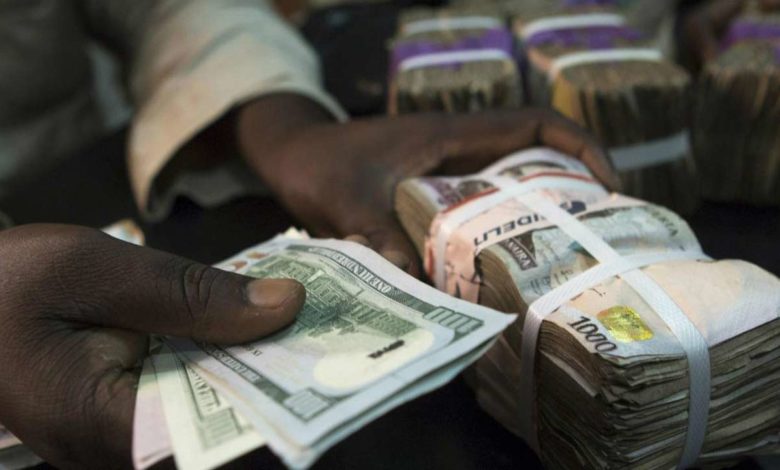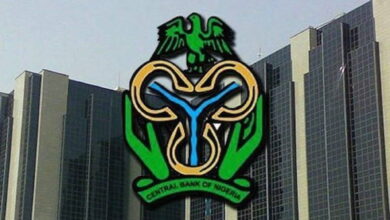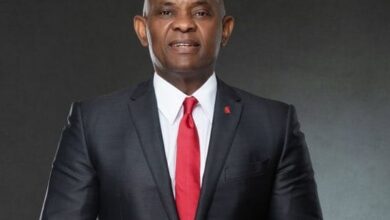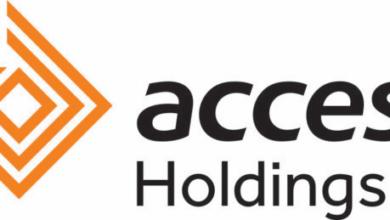Banks, Firms In Currency Risk, Capital Erosion Crisis As Dollar Hits N850

Story/Picture by guardian.ng
- Suffer close to 50 per cent capital erosion in two months
- ‘Basel compliance could impose recapitalisation option’
- Financial institutions in desperate moves to hedge FX liabilities
- Competition for hard currency mobilisation intensifies
- FX savings could go into liquidating dollar-denominated liabilities
- Nigeria risks losing Africa’s biggest economy status
The falling naira has sent a shockwave across the market, throwing many bank chiefs off guard. Whereas the majority of the financial institutions hold foreign currency assets and liabilities, the latter outweighs the former for many in the group. In some cases, findings suggested, liabilities are twice the value of assets.
Added to the uneven distribution of assets and liabilities, the currency crisis has shrunk the books by close to 50 per cent this year alone, putting pressure on the capital adequacy levels of the sector.
Experts note that the banks could on their own be forced to embark on capital adequacy assessment, which could lead to fresh capital raising or the regulator comes up with a reality check exercise that could suggest additional capital sourcing. In either case, shareholders’ value could be diluted as the banks explore the least risky option to beef up their capital.
The Basel arrangement, a global standard of minimal capital and other requirements for banking service, could force the hand of the banks or the Central Bank of Nigeria (CBN), Abiodun Karipe, an Investment research analyst at Afrinvest Group,
The Guardian was informed that the continued depreciation has caused substantial panic with some banks currently scrambling for innovative and insane approaches to plug the widening holes in their books and hedge against the emerging currency risks.
Other local companies with substantial foreign currency liabilities in their books are also caught in the quagmire, sources close to affected organisations revealed.
Most companies affected, according to sources, are affiliates and subsidiaries who have had to feed on their overseas parent companies for critical funding needs.
With the post-floating official exchange rate going up by as much as over 60 per cent, the liabilities of the affected companies have ballooned by over 50 per cent in less than two months.
“The situation is worse for companies that earn in local currency,” a source told The Guardian at the weekend. The source added: “They earn in naira but have to pay or service their loans in dollars. It is easier if a company has strong assets in foreign currencies. Even if it has liquidity issues, with time it could get over it.”
For the banks, there is a renewed scramble for hard currency deposits with some marketers offering unrealistic incentives to depositors.
The Central Bank of Nigeria (CBN) only mandates banks to pay interest rates on savings deposits in local currency, which is pegged at the minimum of 30 per cent of the monetary policy rate (MPR). But The Guardian was informed that some banks offer “juicy monetary” to high net worth individuals for dollar deposits.
It is not clear how the banks could sufficiently use deposit liabilities to hedge currency depreciation risk. And the banks could be sitting on a substantial amount of dollars and other hard currencies as deposits are said to have spiked in recent months with many Nigerians converting their cash holdings to foreign currencies.
But an investment banker, David Adonri, said they could use the deposits as a temporary buffer while exploring more sustainable approaches to deal with the risks.
It would be much better, he argued, if they earned dollar income, as using depositors’ funds to plug liability gaps amounts to postponing the evil days.
Mid-last month, the CBN de-pegged the naira marking renewed pressure exchange and a crash from about N462/$ to N793.7/$ at the Investors’ and Exporters’ (I&E) window at the close of yesterday’s trading session. The black market rates were quoted at between N840 and N858 per dollar.
As naira took a beating last month, Deputy Governor of the CBN (Economic Policy), Dr Kingsley Obiora, toldBloomberg that it was too early to determine when the currency bottomed out.
A continuous falling naira implies capital erosion for banks and other companies that are valued in naira. An economist and financial expert, Dr Chiwuike Uba, told The Guardian yesterday that banks’ capital have been seriously eroded by the currency depreciation by as much as 50 per cent in the past two months.
“And this matters because the banks are global players. Most of them do not only play at the national level. They play at the global level. If your capital was $1 million earlier in the year. Today, it has lost about $400,000. That has serious implications for the valuation of the banks in relations with their peers,” the economist argued.
The naira hemorrhage could continue with the winding down of the CBN’s intervention at the I & E window, leaving the naira sputtering in the past weeks.
Last year, the bank made a total of $17.81 billion in interventions at the inter-bank foreign exchange market to ease demand pressure and stabilise the exchange rate. With market liberalisation, the bank is not compelled to intervene in the market but could only sell as one of the players.
The rising money supply is also adding to the pressure on the demand for naira. According to data obtained from the CBN, the money supply increased to N64.3 trillion in June 2023, the highest recorded by the country. That value is about 16 per cent increase in N55.5 trillion recorded in May.
The fresh crisis comes on the back of huge haircuts Nigerian banks received as a result of their exposure to Ghana’s debt crisis, which the majority, especially the big five, made provision for in their 2022 financials .
Recently, Agusto &Co, a research firm, said Nigerian banks with subsidiaries across Africa had direct and indirect Ghana Eurobond holdings of about $1.7 billion as at December 31 2022. The amount, the report said, accounted for an estimated four per cent of the industry’s investment securities.
Agusto &Co in the report titled, ‘Ghana Debt Crisis and the Impact on Nigerian Banks’, said: “The suspension of interest and principal payment on these bonds by the Ghanaian central government constituted a default in substance and this resulted in bondholders taking haircuts on its value, particularly the investments classified in the amortised cost category. Consequently, the affected Nigerian banks recorded impairment charges on the bond, varying from 10 per cent to 59 per cent of the outstanding value of their respective investments.
“Overall, the industry booked a cumulative impairment charge of about N280 billion ($604 million) on Ghana bonds, which eroded an estimated 19.7 per cent of the industry’s pre-impaired operating profit.
“While the impact of the Ghana exposure is mostly concentrated amongst the tier 1 commercial banks in Nigeria with a few tier 2 and 3 commercial banks, the write down in the value of these bonds had a prominent impact on the Industry’s profitability, given the size of the exposed banks.
“Also, the impairment charges negatively affected the Industry’s ability to enhance capital from operations as profit retained was suppressed.”
Fitch reports had pegged Ghana dollar-denominated international bonds at $13 billion. Last year, big banks booked significantly high negative unrealised foreign currency translation difference, that is the net value after foreign currency liabilities and assets are reconciled.
For instance, Access Holdings Plc, the largest financial group by asset size, booked -N6.7 billion as against N22.4 billion it realised the previous year.
Keripe said the banks could suffer more this year. He also said the majority of them may have to shore up their capital to remain globally relevant.
“When they begin to translate the assets in foreign currencies, they will report a surplus. But when they translate liabilities, they will be a deficit. The question is which carries a higher weight? We think the liabilities are larger. The incomes and expenses also follow the same logic. This will mean more pressure on their balance sheets,” Karipe.
The investment expert, who said he is currently doing research into the degree of impact the banks would take, revealed that tier 1 banks would be more affected as they are more exposed to foreign operations.
About the capitalisation, he said the naira depreciation alone has shrunk the capitalisation of the industry, which may call for the need for recapitalization in the coming months. In dollar terms, he said, Nigerian banks are down in the context of global standards matched with Basel II.
A few Nigerian banks have issued Eurobonds with running interests paid in dollars and the principals are yet to be liquidated. Experts said some of the facilities were used for lending in local currencies. Uba said the crisis will affect banks’ ability to service the loans or repay the principal.
Speaking on the crisis, Adonri said: “A basic principle of foreign borrowing is the ability to earn in hard currency to enable you to repay without facing currency risk. Good risk management practice presupposes that the affected companies or banks took appropriate measures to mitigate the currency risk. Otherwise, they will suffer the consequences of their negligence.
“The banks have deposit liabilities denominated in various currencies, part of which can be utilized to repay foreign debt. If their foreign debts were used to grant credit to customers, repayment by customers may also be in hard currency. It is expected that banks have sufficient risk management tools to prevent the crystallisation of currency risks”
He warned that recourse to deposit liabilities to ward off the threat may just be a reprieve and that as the economy adjusts to the new policy, normalisation would enable banks to cope. Crystalised short-term threats, he said, require emergency intervention such as using deposit liabilities.
Victor Ogiemwonyi, a retired investment banker and member of the Council of the default Nigerian Stock Exchange (NSE), said the banks would have to reprice their FX obligations and look for a way to restructure them into longer-tenor facilities.
Even companies that owe their foreign parent companies, will face huge risks in getting these obligations paid off. The only respite is to stretch the time to repay. For those that also have FX assets, it will dramatically revalue their FX assets upward.
Meanwhile, the currency crisis may have eaten a chunk of the country’s economic standing with other countries, including African nations. As at last year, the country remained the biggest economy in Africa at an out size of $504 billion, followed by South Africa and Egypt with respective gross domestic product (GDP) of $405.87 billion and $404 billion.
Whereas Egyptian pound and Naira have fallen steeply year-to-date, Rand has been fairly stable. Hence, Uba said Nigeria could have dropped as the biggest economy in the continent.





